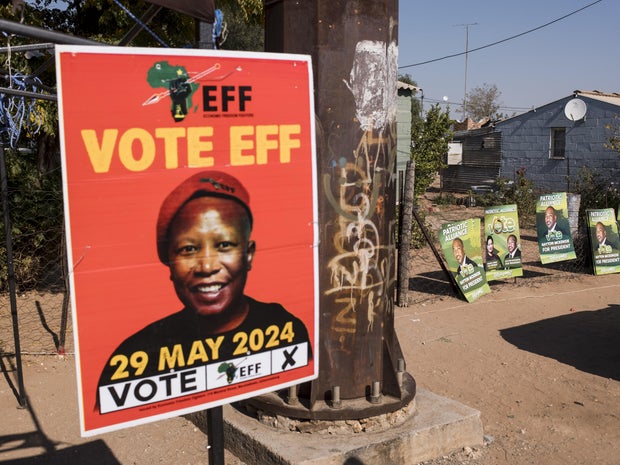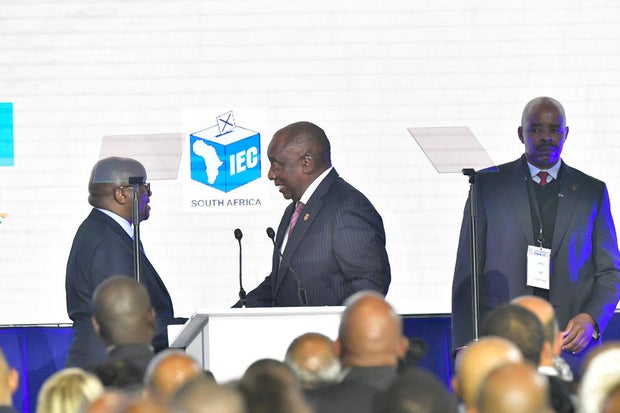Johannesburg — On April 27, 1994, black and white South Africans voted side by side for a new government for the first time in the country’s history. Nelson Mandela’s party, the African National Congress (ANC), defeated apartheid and ushered in a new democratic era.
The ANC came to power with ease and Mandela became South Africa’s first black president, to the delight of a largely adored country. Now, 30 years later, the party that brought democracy to South Africa has been defeated by it.
National election results announced over the weekend saw the ANC lose its electoral majority he has won every vote since Mandela came to power on that historic day three decades ago.
Why did the ANC lose its long-standing majority?
As they headed to the polls to deliver their verdict on the ANC for the seventh time since 1994, South Africans had plenty to complain about.
RAJESH JANTILAL/AFP/Getty
A persistently high unemployment rate, which officially reached 32.9% last year, but in reality is much higher; persistent economic inequalities; rampant corruption and a lack of public service provisionespecially in the poorest areas, they contributed to the dethronement of the ANC.
Then there were the frequent power cuts. Intermittent outages have been nearly constant for more than a year.
There is also a rising crime ratewith 130 murders and 80 rapes documented every day in the last quarter of 2023.
Together, all these factors undermined confidence in the long-standing party in power, and the result was a slap in the face to the ANC, which won just 40.2% of the vote – well below the more than 50% needed to remain in power.
What’s next for South Africa?
Instead, the ANC has two weeks to negotiate a new power-sharing government with members of other parties. This could take the form of a coalition with a smaller party or a national unity government, in which several parties would get roles in a unified cabinet.
The options available could not be more different.
The second largest share of the vote, 21.8%, went to the official opposition Democratic Alliance (DA), which has been on the political scene since the beginning of democracy in South Africa and has historically been a merger between the former apartheid rulers, the National Party and liberal whites who participated in the former apartheid regime but criticized the country’s racist policies.
The DA wants to liberalize the national economy, including a move towards greater privatization, but is dogged by a question of credibility – seen by many black South Africans as a mostly white, middle-class party that does not care about poor.
Then there is the uMkhonto we Sizwe (MK) party, which exploded onto the political scene late last year. It is made up of disgruntled former ANC members and led by disgraced former South African President Jacob Zuma, who faces multiple corruption charges and was once briefly sent to prison in 2021 for defying a court order to testify at an inquiry of corruption.
As a convicted criminal, Zuma cannot run for office, but he remains the face of the party and helped MK wrest 14.9% of the vote from the ANC by appealing to Zulu nationalism.
Like every election since democracy came to South Africa, this one was declared objectively free and fair by observers. But this did not stop Zuma from raising doubts about the results, including public allegations of electoral fraud, without providing any evidence.
On Sunday, the former leader issued an ominous warning.
“The results are not correct,” he said. “The results should not be declared. If you are declaring it, you are provoking us. Don’t create trouble.”
The MK manifesto is anti-constitutional. It talks about nationalizing the SA Reserve Bank and holding a referendum on completely scrapping the Constitution.
Attacks on election results appear to be aimed at damaging the credibility of the vote and creating uncertainty. But Zuma is also fighting for his survival – desperate to avoid his corruption trial, which could very well send him back to prison.
Trailing behind the MK was another ANC splinter party, the Economic Freedom Front (EFF), which argues that the ANC did not correct the racial economic imbalances of apartheid. It wants to redistribute land to the least favored and nationalize mines, banks and other fundamental parts of the economy. But it made no gains in this election, falling to 9.5% and finishing in fourth place.
Jeremy Suyker/Bloomberg/Getty
The ANC could try to form a coalition with the DA or with the EFF and another smaller party, or even with MK, although Zuma is unlikely to agree to this unless the ANC expel its leader, the current southern president. African Cyril Ramaphosa, who seems equally unlikely, at least for now.
The unity option – a possible reset for South Africa?
Alternatively, a national unity government would see a grand multi-party coalition and possibly provide a reset for South Africa.
Despite this country’s multitude of problems and a low voter turnout compared to previous years, democracy still remains strong in South Africa.
The elections were mostly peaceful and South Africans sent a clear message by not giving any party a mandate to govern.
Graceful in defeat, Ramaphosa said the will of the people was clear and accepted the results.
“Our people have spoken, whether we like it or not,” said Ramaphosa. “Through their votes they demonstrated clearly and clearly that our democracy is strong, that our democracy is robust and lasting.”
Sydney Seshibedi/Gallo Images/Getty
He said it seemed clear that South Africans want their leaders, from across the political spectrum, to find common ground and work together.
The cheerful goodwill may evaporate to some extent amid the effort and momentum of coalition building, but the process has revealed a constitutional democracy that is more robust than the chaos Zuma’s party seems to expect.
The next 15 days will be crucial in shaping a government that serves the people of South Africa and, hopefully, returns some confidence in its political leaders.
bol co
jogo de terror online
novela sbt ao vivo
wishlist
musica terra seca
taça png


























